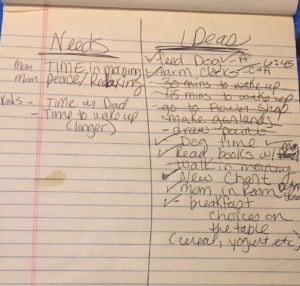
Our morning routine had been going well for so long, and then all of a sudden….it wasn’t. The kids were arguing, “The Things” (that’s what we call them) weren’t getting done, I was nagging, we were late, we were stressed and we weren’t getting along.
We had problem solved this before and it had worked for a good 6 months and then we went on vacation. At first I thought we were just out of whack from our vacation and the routine would come back. After a week, I began to suspect something else was going on and I made adjustments. Another week went by and I realized my adjustments weren’t working, probably because they were my adjustments. I was solving the problem for ME without involving the kids in deciphering why it wasn’t working for THEM either. My focus was on me, assuming something I was doing was the problem. I thought of a bunch of ideas, “I can wake them earlier” I thought, “I’ll snuggle with each of them, I’ll make them lay their clothes out the night before.” It doesn’t surprise me in hindsight that I was met with resistance. This wasn’t about me, it was about US.
Identifying Needs
I called a problem solving meeting, we decided on a time to have it and then we started. “The mornings are too hard for me” I told them. “I am tired of arguing, hassling and nagging. I need more peace in the morning, or the ability to be more relaxed and I need more time to do things for myself before we leave the house.” I asked them what they needed in the mornings, clarifying that needs are not solutions. Solutions fill a need but there are almost always other solutions.
A child wants mom to read a book. The need is connection, the book is the solution.
A child jumps on the couch. The need is to release energy, the solution is jumping on the couch.
Needs are fairly simple, but solutions to needs can be complex. In this case my children continued to offer solutions instead of needs, so I took my cue to Active Listen to flush out the real needs. They wanted an array of things I initially thought were way off topic, but I listened. They wanted to go to go the flower shop in the morning, go for a walk, wake up earlier, sleep with us, paint and draw. Some of these ideas I couldn’t clarify with Active Listening…so I asked “Hmm…how would that help you?” Or “What would that idea do for you?” Suddenly painting, drawing and going for a walk would give them more time to wake up. Sleeping with us would give them time with Daddy. Waking up earlier would give them more time to wake up AND more time with Daddy, so slowly I began to get a picture that they had two needs here that weren’t there before, which is why the routine was no longer working – the needs had changed. The new needs were to spend time with daddy in the morning and to have more time to relax before we started the morning routine. Not entirely surprising since they had spent so much time with their dad on vacation. They were really missing that when it was over and he went back to work.
Brainstorming Ideas

Once we had figured out what we all needed and written them down, we were able to solve the problem fairly quickly. We got a full list of all ideas, accepting them all without judgement. I always like to let the kids list all of their ideas first because as always, the ideas they think of themselves are the ones most likely to stick. I added a few ideas if they got stuck in the process, or if I saw one of my needs wasn’t getting filled. Then we went through and checked the ones that worked for all of us, put “?’s” by the ones that worked for some of us and crossed out the ones we didn’t like at all.
The Plan
Once we had finished brainstorming and evaluating our ideas we were left with a plan!
- I would get the kids alarm clocks and set them 15 minutes earlier so they had 30 minutes to wake up instead of 15.
- After asking Dad about 10 minutes of snuggles each before he left for work, we determined that didn’t me HIS needs, so we adjusted the solution. They would eat breakfast with Dad before he left, instead of just after he left.
- I would make a visual reminder and get rid of our old checklist chart.
- I would go upstairs 10 minutes before it was time to leave and rest so they knew they were responsible without me and didn’t start asking me to do “All The Things”. Believe it or not this was THEIR idea! Apparently, they really do want to do things on their own and sometimes parents just get in the way.
The Next Day
My son woke up with a borrowed alarm clock, then woke his sister, they came downstairs and I read to them. They found their OWN clothes, ate a non-argumentative breakfast with Dad and did all “The Things.” We were out the door just two minutes late…which was all my fault because I couldn’t find my OWN shoes! A problem I can easily solve myself tomorrow.
When we give children the chance to solve their own problems, we empower them to actually be problem solvers. It is when we step in and solve for them, that we rob them of their independence. We send the message that we don’t think they are capable of it and that we, the parent, always have “the better solution.” If children can become aware of and learn to identify their own needs, they begin to see things in a new way. They become empowered to fix their problems while simultaneously regarding the needs of others. This is a life skill I believe will raise the next generation of people who will solve problems with kindness and help make the world a place that will be good for us all.

For More on Problem Solving:
Defining Needs with Maslow’s Hierarchy

Thank you Kelly. This is absolutely wonderful. I will send it to my daughter who has exactly the same sort of problem and, in spite of doing a P.E.T. course(with me!) and believing P.E.T. is wonderful, she makes the same mistake of adjusting HER solutions, “solving the problem for (HER) without involving the kids”.
I find it is very common for all of us, no matter how wonderful we think P.E.T. is, not to put it into practice, or to think we are doing so when in fact we are not. We just don’t realise how much persistence and practice it takes.
Thank you, again, for taking the time to write your story. I think it is the MOST helpful thing, after doing the course, to hear real life stories of people’s successes and failures using P.E.T. skills.
I wish you all the very best,
Janine
Thank you so much Janine! I hope it helps her. We all get a little blind sometimes, don’t we..?